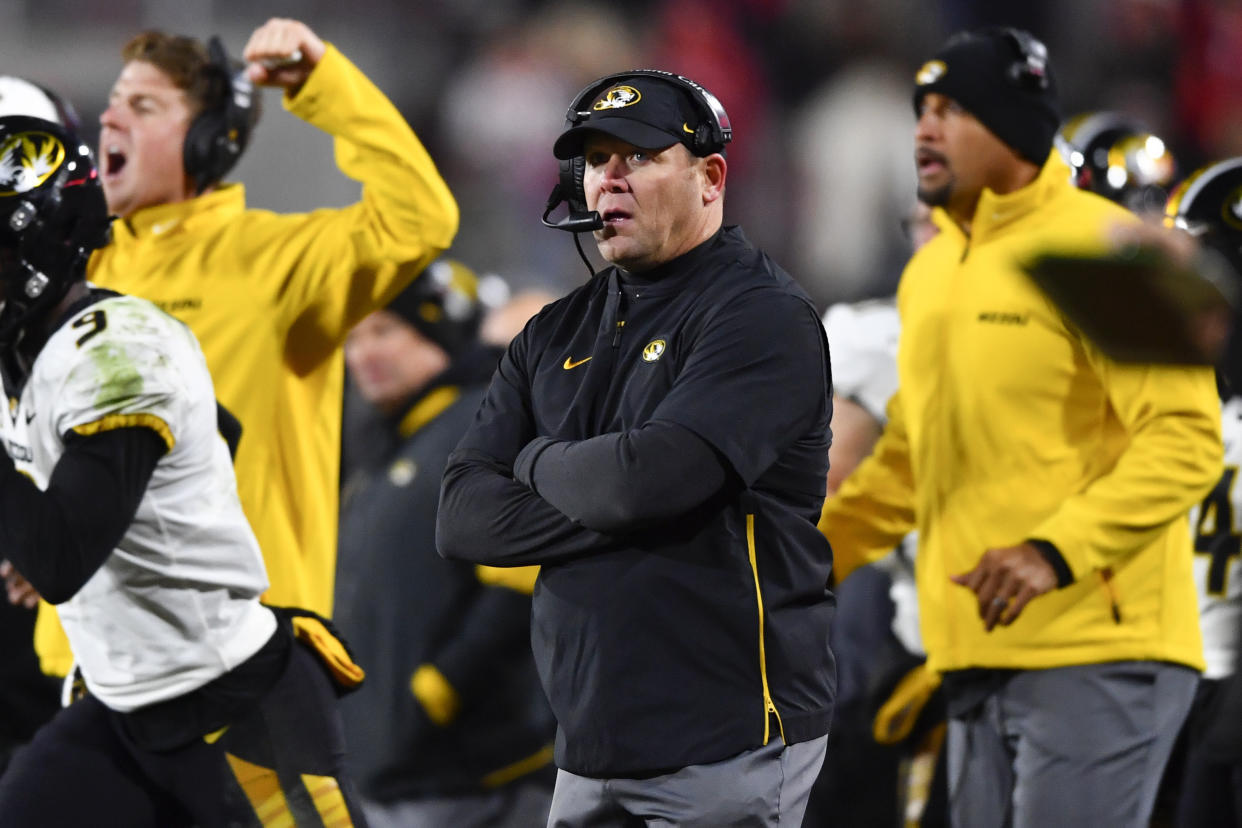NCAA upholds Missouri's postseason ban in football and other sports

The NCAA has upheld the Missouri football team’s postseason ban.
The NCAA formally announced its decision Tuesday, just three days before Missouri’s regular season finale, that the school will officially be ineligible to participate in a bowl game. Missouri, currently 5-6 on the year, would have gone to a bowl game with a win Friday against Arkansas. Now, the Tigers are officially playing their last game of the 2019 season no matter the outcome.
The NCAA penalty — which was announced Jan. 31 — comes as a result of a former Missouri tutor completing academic assignments for 12 student-athletes, including several football players. Because of those violations, the football program was hit with a postseason ban, scholarship reductions and other penalties by the NCAA’s Committee on Infractions.
The school’s baseball and softball programs were also given postseason bans for the upcoming season in the case. Those bans were additionally upheld.
Missouri said it believed the sanctions were “overly harsh” and “contrary to NCAA case precedent” when it filed an appeal back in March. The school later presented to the NCAA appeals committee in July and the impending decision about the Tigers’ postseason fate loomed all football season.
Back at SEC Media Days in July, Missouri head coach Barry Odom said the school expected some closure on the situation “soon,” with some reports indicating mid-August or September as a possibility. Instead, that closure did not come until three days before the end of the Tigers’ season with a bowl berth on the line.
“We are deeply disappointed and appalled by the NCAA Infractions Appeals Committee's decision to shirk its responsibilities and simply uphold sanctions that are not consistent with precedent or even common sense,” Missouri chancellor Alexander Cartwright and athletic director Jim Sterk said in a joint statement.
“Despite this frustrating and disappointing outcome, the University of Missouri and Mizzou Athletics will continue to stand for integrity, and we will become stronger despite the challenges we are faced with today.”
Missouri’s football team will be unable to use five of 85 allowed scholarships in 2020.
Why was Missouri hit with NCAA penalties?
Back in November 2016, a former Missouri tutor named Yolanda Kumar revealed in a Facebook post that she “participated in academic dishonesty,” including completing “entire courses” for student-athletes. Kumar later told the Kansas City Star that she was “groomed” to help athletes stay eligible and “felt harassed” to help athletes with their work while staying in regular contact with academic coordinators.
Her public comments put the situation on the NCAA’s radar. More than two years later, the NCAA announced penalties for Missouri. Some of the NCAA’s findings corroborated Kumar’s statements. The NCAA said she “completed an entire course” for one football player and “assisted” two football players with the “completion of Missouri’s math placement exam.”
Missouri hurt by its own cooperation
Missouri cooperated with the NCAA throughout the investigation and even agreed that a Level I violation — the most severe in NCAA parlance — took place. That move backfired. Dave Roberts, a member of the NCAA’s Committee on Infractions, admitted in a conference call with the media that Missouri’s forthcomingness actually contributed to the severity of the penalties levied against the school.
Subsequently, Missouri athletic director Jim Sterk said the NCAA was now sending a message that “proactive self-reporting” of violations and “exemplary cooperation” with NCAA investigators is not of “any value” to the Committee on Infractions.
“Today's decision raises serious questions about whether the current NCAA enforcement system encourages or discourages cultures of compliance and integrity. While we have exhausted our NCAA appeal avenues, we will continue to advocate for meaningful reform within the NCAA enforcement process,” Cartwright and Sterk said in their statement.
In announcing its decision to uphold the postseason ban, the NCAA said Missouri “was unable to demonstrate that the Committee on Infractions’ analysis and/or rationale failed to consider and weigh mitigating factors; was based on a clear error in judgment; was based on irrelevant or improper factors; or was based on an incorrect standard or misunderstanding of standards” in its appeal to overturn the penalties.
“When reviewing the penalties, the Infractions Appeals Committee noted that the Committee on Infractions has significant discretion in its ability to determine appropriate penalties for a case,” the NCAA said in a release. “Additionally, the Infractions Appeals Committee said it is hesitant to overturn a penalty within the appropriate penalty guidelines unless there is a clear indication of arbitrary decision-making.”
Missouri said it “strongly disagrees” with the notion that the appeals committee “did not have the power” to overturn the decision.
Additionally, SEC commissioner Greg Sankey said the penalties levied toward Missouri are “unusually severe when fully considered.”
“It is regrettable that so many innocent current Missouri student-athletes across three sports will miss postseason opportunities due to actions for which they were not responsible,” Sankey said.
Barry Odom: I hate this news for our seniors
After the sanctions were initially announced, Odom characterized the penalties as “completely unjust and unfair.” He was especially perplexed by the recruiting sanctions, which includes a seven-week ban on unofficial recruiting visits and a reduction of official visits and the amount coaches can communicate with prospects.
“It had zero to do with recruiting infractions. You talk about loss of scholarships, that’s affecting kids’ lives,” Odom said.
In a statement released Tuesday, Odom spoke of the seniors on his team who will not have the chance to finish their college careers playing in a bowl game.
"I hate the news for our program and for our seniors who have represented the University in a very positive way,” Odom said. “This decision negatively impacts their short experience in life as college student-athletes who had nothing to do with this situation. It's a tough lesson to be dealt, but they will learn from this and motivationally use it later in life when hardship comes along."
More from Yahoo Sports:

